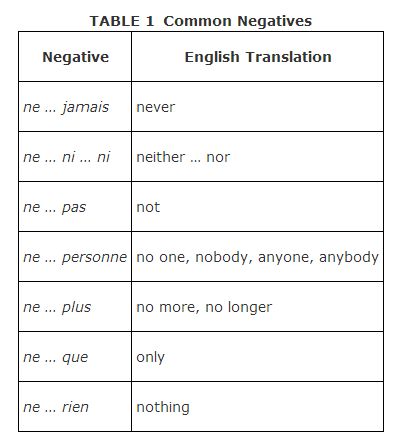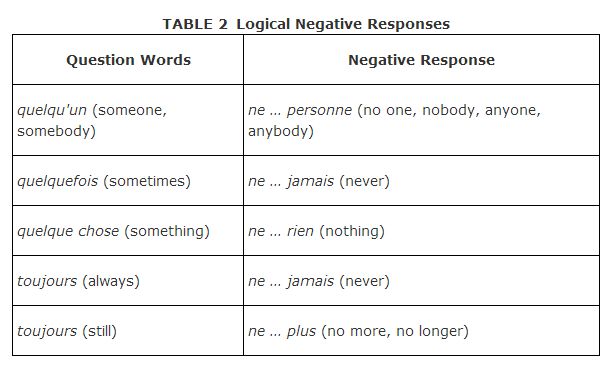Common Negative Words and Phrases
Negatives express not, never, neither… nor, no longer, no more, no one, nobody, only, and nothing.
Like English, double negatives are not used in French; however, in French, a negative is generally made up of two parts, which must be placed properly. Forming the negative may or may not include the word non (no).
In addition, certain negative expressions are used colloquially and idiomatically and are necessary parts of everyday conversation.
Of the most commonly used negatives, listed in Table 1, ne … pas is the most frequently used. Consider the following examples:

- Je ne fume pas. (I don't smoke.)
- Elle ne conduit jamais. (She never drives.)
Some words used in questions produce a logical negative response, as in the following examples. Table 2 contains more logical negative responses.

- Tu cherches quelqu'un? (Are you looking for someone?)
- Je ne cherche personne. (I'm not looking for anyone.)
Some high frequency negative expressions include the following:
- ça ne fait rien (it doesn't matter)
- Tu es en retard. (You're late.) Ça ne fait rien. (It doesn't matter.)
- de rien (you're welcome) and il n'y a pas de quoi (you're welcome)
- Merci beaucoup. (Thanks a lot.) De rien. [Il n'y a pas de quoi.] (You're welcome.)
- jamais de la vie! (never! out of the question! not on your life!)
- Tu veux piloter un avion? (Do you want to pilot an airplane?) Jamais de la vie! (Not on your life!)
- pas du tout (not at all)
- Ça vous énerve? (Does that bother you?) Pas du tout. (Not at all.)
- pas encore (not yet)
- Tu veux manger? (Do you want to eat?) Pas encore. (Not yet.)
- pas maintenant (not now)
- On sort? (Shall we go out?) Pas maintenant. (Not yet.)
|
|
|
|
|
|
|
|
|
|
|
|
|
|
|
|
|
|
|
|
|
|
|
|